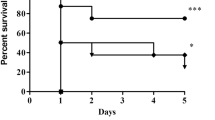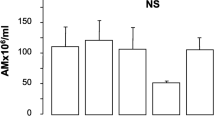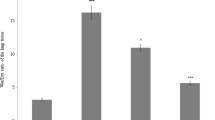Abstract
Objective
Acute lung injury following peritonitis constitutes an enigmatic clinical problem with no specific therapy. Recently, immunomodulators such as azole compounds have been shown to attenuate shock-related tissue injury. The present investigation was undertaken to study the effect of fluconazole on acute lung injury and survival following faecal peritonitis in rats.
Subjects
Male Wistar rats weighing 225–235 g.
Design and setting
Faecal peritonitis (Fp) was produced in four groups of adult male Wistar rats by intraperitoneal administration of non-sterile faecal suspension (1:1 w/v saline). A fifth group of rats was given sterile faecal material (SFM), which served as control.
Interventions
Rats in Fp groups were given fluconazole in doses of 0 mg/kg, 3 mg/kg, 10 mg/kg, and 30 mg/kg by gavage 30 min before induction of peritonitis. The control animals received an equal volume of distilled water.
Measurements and results
Survival over a period of 72 h, oxidative stress, neutrophil activity, and lung injury were measured. This study showed a 90% survival in the fluconazole-treated group compared to only 20% survival in untreated rats (P<0.008 log-rank test). The lungs of animals with Fp showed massive pathological changes including intraalveolar oedema, fibrosis, and mixed inflammatory cell infiltrate. These changes were dose-dependently attenuated by fluconazole. Enhanced oxidative stress (P<0.001) and neutrophil activity in the peritoneal fluid and lung (P<0.001) in Fp animals was dose-dependently reduced by fluconazole.
Conclusion
This study clearly suggests the role of neutrophils in Fp-induced tissue injury/mortality, which may be dose-dependently, attenuated by fluconazole.






Similar content being viewed by others
References
Schein M (1991) Planned reoperations and open management in critical intra abdominal infections: prospective experience in 52 cases. World J Surgery 15:537−545
Jacobs S, Sobki S, Morais C, Tariq M (2000) Effect of pentaglobin and piperacillin on survival in a rat model of faecal peritonitis: importance of intervention timings. Acta Anaesth Scand 44:88−95
Carey PD, Jenkins JK, Byrne K, Schneider AM, Walsh CJ, Fowler AA, Sugerman HJ (1992) Neutrophil short-lived oxidant production: enhancement following onset of sepsis-induced lung injury. Circ Shock 36:256−264
Sheridan BC, Mcintyre RC, Agrafojo JR, Meldrum DR, Meng X, Fullerton DA (1996) Neutrophil depletion attenuates endotoxin induced dysfunction of CGMP mediated pulmonary vasorelaxation. Am J Physiol 271:L820−L828
Zeiher BG, Matsuoka S, Kawabata K, Repine JE (2002) Neutrophil elastase and acute lung injury: prospects for silvestat and other neutrophil elastase inhibitors as therapeutics. Crit Care Med 30[Suppl]:S281−S287
Noronha-Blob N, Lowe VC, Otterbein L, Steranka L, Burch RM (1993) NPC 15669 reduces mortality associated with sepsis in rats. J Pharmacol Exp Ther 267:664−669
Greenman RL, Schein RMH, Martin MA, Wenzel RR, Mcintyre NR, Emmanuel G, Chmel H, Kohler RB, McCarthy M, Plouffe J, Jane A, Russell JA (1991) Controlled clinical trial of E5 murine monoclonal Igm antibody to endotoxin in the treatment of gram negative sepsis. JAMA 266:1097−1102
Rowan Kelly B, Ferrante A, Thong YH (1984) Modification of polymorphonuclear leukocyte function by imidazoles. Int J Immunopharmacol 40:186−192
Vudhakul V, McCormak JG, Seew WK, Thong YH (1989) Effects of the newer antifungal agents (bifonazole ICI 195739 and amorolfin) on in vitro phagocytic, lymphocytic and natural killer cell responses. Int J Immunopharmacol 11:817−828
Drummond DC, Wong CW, Whitman LM, McCormack JG (1995) The effects of amphotericin B, fluconazole and miconazole on neutrophil and lymphocyte function in a guinea pig model. J Antimicro Chemo 36:375−384
Slotman GJ, Burchard KW, D'Arezzo, Gann DS (1988) Ketoconazole prevents acute respiratory failure in critically ill surgical patients. J Trauma 28:648−654
ARDS Network Authors for the ARDS Network (2000) Ketoconazole for early treatment of acute lung injury and acute respiratory distress syndrome. A randomized controlled trial. JAMA 283:1995–2002
Buijk SLCE, Gyssens IC, Mouton JW, Verbrugh HA, Touw TJ, Bruining HA (2001) Pharmacokinetics of sequential intravenous and enteral fluconazole in critically ill surgical patients with invasive mycoses and compromised gastro-intestinal function. Int Care Med 27:115−121
Zervos EE, Boss SS, Robinson MC, Rosemurgy AS (1996) Fluconazole increases bactericidal activity of neutrophils through non-cytokine mediated pathway. J Trauma Injury Infect Crit Care 41:465−470
Pitzurra L, Fringuelli R, Perito S, Schafeella F, Barluzzi R, Bistoni F, Vecchiarelli A (1999) A new azole derivative of 1,4 benzothiazine increases the antifungal mechanisms of natural effector cells. Antimicrob Agents Chemotherap 43:2170–2175
Salartash K, Galluci J, Quinn J, Catalono E, Slotman G (1996) The cardiopulmonary, eicosanoid and microanatomical effects of fluconazole during graded bacteraemia. Shock 6:206−212
Vela AR, Littleton JC, O'Leary JP (1999) The effects of minidose heparin and low molecular weight heparin on peritonitis in the rat. Am J Surg 67:473–477
Jacobi SA, Sterzel SA, Braumann E, Halle E, Stosslein K, Krahenbuhl L, Muller JM (2001) The impact of conventional and laparoscopic colon resection (CO2 or helium) on intraperitoneal adhesion formation in a rat peritonitis model. Surg Endosc 15:380–386
Goldblum SE, Wu KM, Jay M (1985) Lung myeloperoxidase as a measure of pulmonary leukostasis in rabbits. J Appl Physiol 59:1978−1985
Liluis E, Waris M (1984) A very sensitive and rapid chemiluminescence method for the measurement of phagocytosis. Analytical applications of bioluminescence and chemiluminescence. Academic, New York, pp 401−404
Beauchamp E, Fridovich I (1971) Superoxide dismutase: improved assays and an assay applicable to acrylamide gels. Anal Biochem 44:276−287
Sawyer RG, Adam RB, Rosenlof LK, May AK, Pruett TL (1995) Effectiveness of fluconazole in murine candida albicans and bacterial C. Albicans peritonitis and abscess formation. J Med Vet Mycol 33:131−136
Rosemurgy AS, Sweeney JF, Albrink MH (1993) Implications of candida antigen titers in injured adults. Contemp Surg 42:327
Horn R, Wong B, Kiehn TE, Armstrong D (1985) Fungemia in a cancer hospital: changing frequency, earlier onset and results of therapy. Rev Infect Dis 7:646
Matute-Bello G, Frevert CW, Kajikawa O, Skerret SJ, Goodman RB, Park DR, Martin TR (2001) Septic shock and acute lung injury in rabbits with peritonitis. Failure of the neutrophil response to localized infection. Am J Respir Crit Care Med 163:234−243
Heemken RL, Gandawidaja L, Hau T (1997) Peritonitis: pathophysiology and local defense mechanisms. Hepatogastroenterology 44:927–936
Stephens K, Ishika A, Wu Z, Larrick J, Raffin T (1988) Granulocyte depletion prevents tumor necrosis factor mediated acute lung injury in guinea pigs. Am Rev Respir Dis 138:1300
Fantone JC, Ward PA (1985) Polymorphonuclear leukocyte mediated cell and tissue injury: oxygen metabolites and their relations to human disease. Human Pathol 16:973−978
Basadre JO, Sugi K, Traber DL, Niehaus GD, Herndon DN (1988) The effect of leukocyte depletion on smoke inhalation injury in sheep. Surgery 104:208−215
Burch RM, Weitzberg M, Noronha-Blob L, Lowe VC, Bator JM, Perumattam J, Sullivan J (1992b) Leumelins-novel leukocyte recruitment inhibitors with activity in animal models of dermatitis, sepsis and inflammatory bowel diseases. Drugs News Perspect 5:331−337
Suzuki M, Nakamura M, Mori M, Miura S, Tsuchija M, Ishii H (1995) Lansoprazole inhibits oxygen derived free radicals production from neutrophils activated by Helicobacter pylori. J Clin Gastroenterol 20[Suppl 2]:S93−S96
Wandall JH (1992) Effects of omeprazole on neutrophil chemotaxis, superoxide production, degranulation and translocation of cytochrome b. Gut 33:617−621
Welty Wolf KE, Carraway MS, Huang YT, Simonson SG, Kantrow SP, Kishimoto TK, Piantodosi CA (2001) Antibody to intercellular adhesion molecule 1 (CD54) decreases survival and not lung injury in baboons with sepsis. Am J Respir Crit Care Med 163:665−673
Spark JI, Scott DJA (2001) Role of the neutrophil in the development of systemic inflammatory response syndrome and sepsis following abdominal aortic surgery. Br J Surg 88:1583−1589
Pesanti EL, Nugent KM (1985) Modulation of pulmonary clearance of bacteria by antioxidants. Infect Immun 48:57−61
Goode HF, Webster NR (1992) Free radicals and trace element metabolism in sepsis and injury. Br J Intensive Care 2:312−322
Simons RK, Maier RV, Lennard ES (1987) Neutrophil function in a rat model of endotoxin induced lung injury. Arch Surg 122:197−203
Acknowledgements
The authors wish to thank Mr. DY Nayagam, Mr. Jesuraja Rajakana, and Mr. Khalid Elfaki for their assistance in experimental work and Ms. Tess Jaime for typing the manuscript.
Author information
Authors and Affiliations
Corresponding author
Rights and permissions
About this article
Cite this article
Tariq, M., Moutaery, A.A., Arshaduddin, M. et al. Fluconazole attenuates lung injury and mortality in a rat peritonitis model. Intensive Care Med 29, 2043–2049 (2003). https://doi.org/10.1007/s00134-003-1960-3
Received:
Accepted:
Published:
Issue Date:
DOI: https://doi.org/10.1007/s00134-003-1960-3




